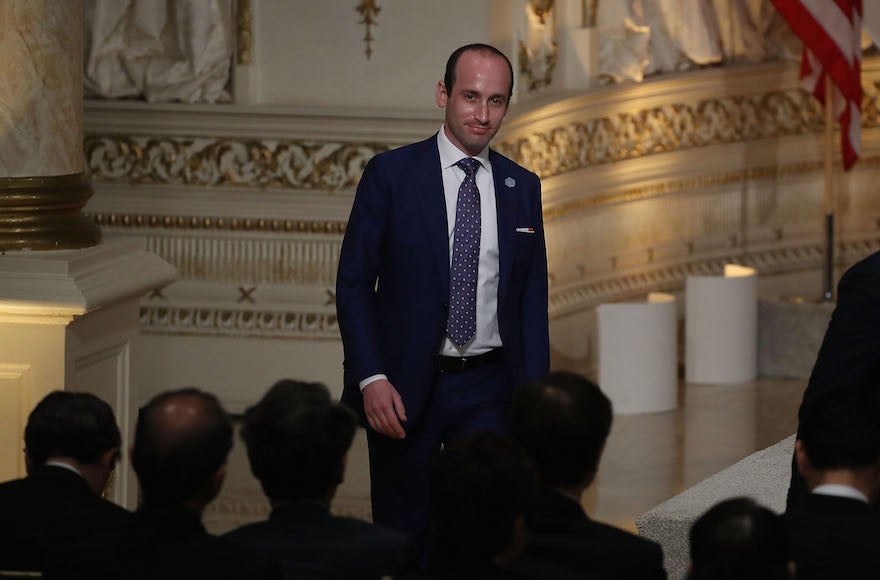(JTA) — Rabbi Neil Comess-Daniels didn’t mince words when he criticized Stephen Miller, a senior adviser to President Donald Trump and a former congregant of his Southern California synagogue, in his Rosh Hashanah sermon.
“Honestly, Mr. Miller, you’ve set back the Jewish contribution to making the world spiritually whole through your arbitrary division of these desperate families at our southern border,” Comess-Daniels said.
The rabbi, who leads Beth Shir Shalom, a Reform synagogue in Santa Monica, devoted his Monday sermon to denouncing Miller’s role in crafting Trump’s “zero-tolerance” policy, which separates migrant children from their parents at the border.
“The actions that you now encourage President Trump to take make it obvious to me that you didn’t get my, or our, Jewish message,” Comess-Daniels said of Miller.
Miller’s family joined the synagogue when he was 9 or 10 but left after a year or two, the rabbi said. Miller attended Hebrew school there, and though Comess-Daniels worked there at the time, he does not remember Miller. Miller’s family also belonged to The Santa Monica Synagogue, a Reform temple where he was confirmed in 2001, when he was in the 10th grade.
Comess-Daniels said he has not been in touch with Miller or his family since they left Beth Shir Shalom, which describes itself online as a “Progressive Reform Synagogue.”
His sermon on the first day of the Jewish New Year has drawn widespread media coverage and speaks to a debate about whether rabbis should bring politics into the synagogue. While some rabbis see it as their obligation to address pressing political issues, others avoid them for fear of alienating congregants who may not share their views.
Comess-Daniels told JTA in a phone interview that he feels it is his “responsibility” to speak about a “pressing moral and ethical issue,” and that he was met with applause during his sermon.
Though he has talked about Miller before in his sermons, this time the rabbi spoke to him personally and did not just address his policies. Comess-Daniels cited multiple reasons as to why he decided to focus on the Trump adviser this time, including that many congregants had “expressed despair” over the president’s immigration policies and “because Judaism believes in individual responsibility.”
He picked Rosh Hashanah, he said, because “I wanted as many people to hear this message as possible.”
Rabbi Sharon Kleinbaum of Congregation Beit Simchat Torah, an LGBTQ synagogue in Manhattan, and a vocal critic of the president, sees no issue with focusing on Miller in such a direct and personal way. Like Comess-Daniels, she has taken part in protests over the Trump administration’s travel ban targeting various Muslim countries.
“I imagine many rabbis know things that congregants have done that are less than ideal, and they’re working it through with their rabbis in the appropriate way,” she told JTA. “In this case, however, when Stephen Miller is advocating a public policy which so deeply violates our Jewish values, I applaud his rabbi for calling him out on it.”
Rabbi David Wolpe of Sinai Temple, a Conservative congregation in Los Angeles, sees the issue differently.
“I understand why a rabbi might want to specify someone who is a [former] member of the congregation, but my own inclination would be that that is less helpful than telling people what they ought to do,” he said. “I prefer that as a mode of High Holiday speaking rather than telling them why what someone else did is bad.”
Rabbi Shmuel Herzfeld of Ohev Shalom Synagogue, an Orthodox congregation in Washington, D.C., is an activist who has taken part in protests against white supremacists, gun violence, anti-Semitism and, in a memorable protest at a pro-Israel conference in 2016, then-candidate Donald Trump. He said the subject of calling out individuals from the pulpit is nuanced but that he prefers speaking about issues.
“I actually think that rabbis are more effective when we talk about issues and not about people, but each situation is different,” he told JTA.
In the case that a rabbi chooses to criticize a specific person, Herzfeld said it was important to present “a space for a possibility of redemption, of allowing people to return.”
Comess-Daniels, who said he was “surprised” by the media coverage of and interest in his sermon, seemed to present Miller with that option in his sharply worded speech.
“You can choose to accept responsibility for the havoc you’ve created and the wounds you’ve inflicted – or not,” he said. “You can feel that you have indeed wronged these people and apologize to them – or not. You can take some action that seeks to heal and rectify the injury you’ve caused – or walk away, wrapping yourself in the deflecting guise of ‘national security.’”
JTA has documented Jewish history in real-time for over a century. Keep our journalism strong by joining us in supporting independent, award-winning reporting.






